2011–2012 RBS-UVA Fellows
The RBS-UVA Fellowship is a new program that provides undergraduate and graduate students at the University of Virginia with scholarships to attend RBS courses that substantially inform year-long projects (viz., a Distinguished Major’s thesis, an article, a dissertation chapter, an exhibition) that they submit to RBS upon completion. The 2011–12 cohort of RBS-UVA Fellows includes:
- Emma Whittington - CLAS 2012, Comparative Literature
**Recipient of the 2011–12 RBS-UVA Fellowship Project Award — click here to see Emma's project** - Christine Schott - Doctoral Candidate, Department of English
**2011–12 RBS-UVA Fellowship Project Honorable Mention — click here to see Christine's project** - Hannah Barefoot - CLAS 2011, Studio Art & English
- Jenny Braun - Doctoral Candidate, Department of English
- Katia Fowler - Master’s Candidate, Department of English
- Rosemary Lee - Doctoral Candidate, Department of History
- Emma Solberg - Doctoral Candidate, Department of English
Emma Whittington
Recipient of the 2011–12 RBS-UVA Fellowship Project Award
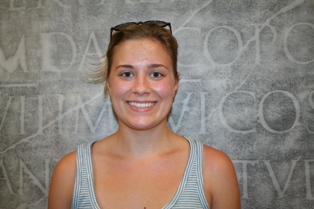
Distinguished Major, Comparative Literature (CLAS 2012)
Borges and Ficciones: The Transmutation of a Text
UVAToday article on Emma's project
This thesis project owes itself to the immense aid of Rare Book School and the faculty therein. I believe that the strength of my project is its synthesis of literary criticism and bibliography, and its utilization of the myriad resources so unique to UVA and Rare Book School. The School not only made me aware of UVA’s vast collection of Borges material, but it also provided me with the foundation necessary to undertake such an exact and detail-driven examination of literature. Specifically I refer to the class I was provided the opportunity to take, The American Book in the Industrial Era. Michael Winship’s class provided me with a solid foundation for my understanding book production methods, and gave me the confidence to consider elements of the text that I was not aware of prior to my time with Rare Book School.
What was also enlightening about my time with Rare Book School was the realization that there exists a strong community of intellectuals who are deeply interested in the formal elements of a text, and who believe these elements tell a story essential to our understanding of a given work. This is an approach to literature that I was not fully aware of even one year ago, an approach that came to guide the way in which I conducted my own research. Finally, I would like to characterize my time as an RBS-UVA Fellow as one marked by continual support and encouragement; it is this attitude towards scholarship which allows projects such as my own to flourish so fully.
Christine Schott
2011–12 RBS-UVA Fellowship Project Honorable Mention
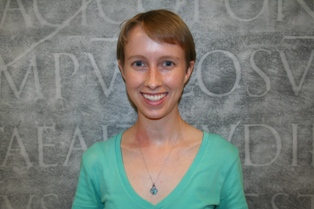
Doctoral Candidate, Department of English
A Digital Presentation of the Marginalia of the B-Text of The Vision of Piers Plowman
The project I undertook as an RBS-UVA Fellow was creating a digital archive of the marginalia found in Piers Plowman B-text manuscripts. My doctoral research in medieval reading practices made this project particularly apropos for my own purposes, but I hope its usefulness might not be limited to such a narrow audience.
In my RBS course, XML in Action, I learned the practical and theoretical background of the Text Encoding Initiative (TEI), with which I had previously only had ad hoc experience. The course taught me not only how to encode a text for digital use, but why such endeavors have been standardized. A TEI-compliant project like mine can be transferred from one editorial team to another, or from one format to another, without losing its richness and legibility. I have rendered my XML document as a web page for a browser, but being provided with the raw document, another editor could render it in a completely different form, or even combine it with another TEI project, without reinventing the raw code itself.
This project has proven highly useful for my dissertation and has furnished the material for an article currently under revision for publication; in fact, I have received approval from the Piers Plowman Electronic Archive, my partners in this endeavor, to undertake the same project with the C-text manuscripts. I hope RBS will be pleased with this return on their fellowship investment, and I hope the site will prove as interesting to others as it has to me.
Hannah Barefoot
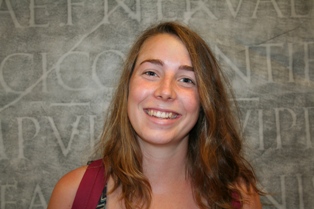
Distinguished Major, McIntire Department of Studio Art (CLAS 2012)
"Other Side of Air" (A Book and Installation)
UVAToday article on Hannah's project
My experience in the Rare Book School class Printed Books since 1800: Description & Analysis during the summer of 2011 provided me with an understanding of book production and bibliography in the nineteenth and twentieth centuries. I found our discussions of the details of bookbinding, illustration, and papermaking the most interesting. For my thesis in studio art, I concentrated on researching papermaking. I found the Rare Book School class I took to be an interesting means of studying papermaking, bookbinding, and printmaking from a different perspective. Although my project that I pursued through the 2011–2012 school year did not center on bibliography or rare book sales, I did think about the past century’s influence on books, and especially on the manufacturing of paper. I focused mostly on craft in my written thesis that I have included in my final RBS project. I also spent part of the summer researching contemporary handmade papermaking. In contrast to the direction most publishing houses have pursued, I focused on the unique and handmade artist’s book. I made a book for my final project, and used it to draw a conceptual bridge between the sculptures I made with steel and paper and the screen prints on the wall.
Jenny Braun

Doctoral Candidate, Department of English
My research on colonial North America and early national United States considers how knowledge is produced through processes of exchange. More specifically, my dissertation explores the intersection of property rights, copyright, and botanical networks in a variety of British and colonial writings. Through Rare Book School, I have learned that the concepts and theories inspired by these writings—theories of sociality, hospitality, commoditization, settlement, and transatlantic exchange—are fundamentally richer and more nuanced when derived from the material realities of print culture and the archival record.
I took James N. Green’s course The History of the Book in America before I began my dissertation and the experience will continue to yield rewards. The course also informed a project on representations of property and indigenous literacies in New England missionary literature. Missionary literature is often overlooked in American literature courses, though through its printing and reception history I argue that the literature’s concepts of mobility, exchange, and identity at once frame and offer alternatives to later narratives of native-settler encounters. At the Modern Language Association Annual Meeting in Seattle, Washington, I presented a paper “Hospitable Conversions and the Epistemology of Property in John Eliot’s Indian Dialogues (1676)” that considered the history of the Cambridge Press, which was the first printing press in British North America, and how the tracts circulated in the colonies and the metropole. In the RBS course, we began with a session on New England printing and examined the missionary John Eliot’s Indian Bible, the first bible printed in North America and written in Algonquin.
Katia Fowler
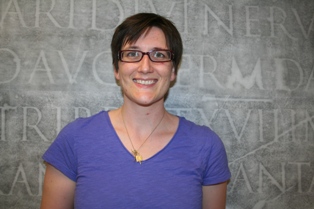
M.A. Candidate, Department of English
A Critical Edition of Ten Poems by Katherine Philips
I can’t thank RBS enough for this opportunity. To put it simply, this project would not exist without the RBS-UVA Fellowship that enabled me to take Heather Wolfe’s English Paleography, 1500–1750. Before I took the course, I could not read the manuscripts I needed to transcribe for my edition. Heather Wolfe exposed us to such a wide range of manuscripts that I felt confident approaching my texts and handling scribal idiosyncrasies. A significant improvement from illiteracy! I was able to tackle all the secretary letterforms as well as the scribal abbreviations I encountered in my manuscripts. Additionally, her class helped me learn what features of a manuscript are of interest to paleographers. I have worked to incorporate this sort of information into my textual notes, and I intend to add more in the version of this project I will present for my master’s thesis. The class was a delight and provided me with a skill that will continue to serve me throughout my scholarly career.
Rosemary Lee
Doctoral Candidate, Department of History
The Propaganda Fide’s “Team of Experts” and the Polyglot Press
My dissertation explores the relationship between orientalism and evangelization in early modern Italy. Specifically, I am exploring the “knowledge” which Italian orientalists created about the Ottoman Empire and Islam, and how this knowledge shaped the ways European missionaries, diplomats, and merchants approached the Ottoman state and Ottoman subjects. My dissertation focuses on the world traveler Pietro della Valle and the team of “experts” whom he encountered on his travels, or with whom he associated in Rome.
The intellectual community which influenced Della Valle’s work revolved around the Propaganda Fide and its Polyglot Press. This congregation, founded in 1622, focused on evangelizing the Ottoman Empire and greater Islamic world. The Congregation’s decision to pursue publication as the means by which to engage with Muslim-majority societies had a tremendous impact on orientalist studies. The Congregation’s monopoly on Arabic-language printing in Italy ensured that its board of directors would become major players in the life of Della Valle’s community.
Since the Polyglot Press played such a crucial role in my dissertation, it became important for me to learn more about printing. The RBS-UVA Fellowship enabled me to attend James Mosley’s Type, Lettering & Calligraphy course during RBS’s 2011 Summer School. During that course, James Mosley introduced me to the mechanics of early modern printing. We discussed films on the type-cutting process, and watched James Mosley perform a type-casting demonstration. After my course at Rare Book School, I could engage much more confidently with the sources on the Polyglot Press that I had transcribed in the Propaganda Fide archives. Even after my course at Rare Book School, the Rare Book School staff continued to support me in my work. Barbara Heritage opened the Rare Book School’s library to me, and helped me locate important monographs that greatly informed my understanding of early modern print technologies. I am very grateful for all of their assistance.
Emma Solberg
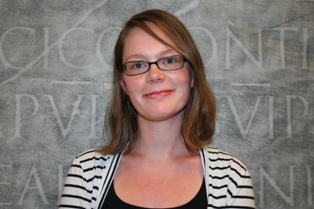
Doctoral Candidate, Department of English
A Dissertation Chapter on the N-Town Manuscript
My name is Emma Solberg, and I am an ABD Ph.D. candidate in the English department here at UVA. I specialize in medieval and Renaissance English drama. At RBS, I took Albert Derolez’s Introduction to Western Codicology course. I had no background in codicology, and hoped to learn enough to enable me to properly study the late medieval N-Town manuscript, the key text of my dissertation. While the N-Town manuscript is one of the giants of medieval English drama, it also stands apart from its peers and demands a level of familiarity with manuscript studies and textual criticism that I did not possess. The most famous medieval English Corpus Christi cycle, the York cycle, is a record of an annual theatrical event that involved hundreds of actors, rolling double-tier pageant wagons, and elaborate special effects. The extant text of the York cycle, the Register of 1463–77, is often described as a snapshot of a long-lived production. Like the York register, the N-Town manuscript contains a collection of plays that dramatize Biblical history. But unlike the York register, the N-Town plays do not document any particular performance. Scholars agree that a scribe compiled the N-Town manuscript in East Anglia circa 1500, but for what purpose, no one has been able to firmly establish. My goal as a student at RBS was to learn how to deal with the N-Town manuscript on its own terms. Thanks to Professor Derolez, I am now able to use Meredith and Kahrl’s facsimile of the N-Town manuscript as the foundation of my work.